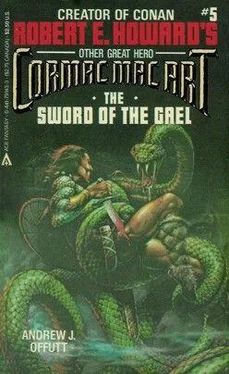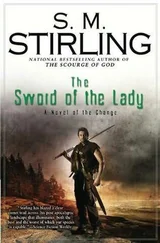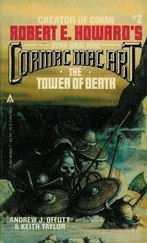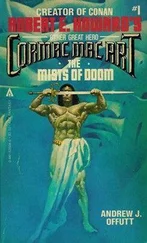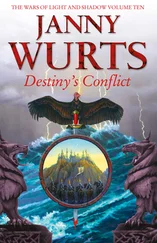Andrew Offutt - The Sword of the Gael
Здесь есть возможность читать онлайн «Andrew Offutt - The Sword of the Gael» весь текст электронной книги совершенно бесплатно (целиком полную версию без сокращений). В некоторых случаях можно слушать аудио, скачать через торрент в формате fb2 и присутствует краткое содержание. Жанр: Фэнтези, на английском языке. Описание произведения, (предисловие) а так же отзывы посетителей доступны на портале библиотеки ЛибКат.
- Название:The Sword of the Gael
- Автор:
- Жанр:
- Год:неизвестен
- ISBN:нет данных
- Рейтинг книги:3 / 5. Голосов: 1
-
Избранное:Добавить в избранное
- Отзывы:
-
Ваша оценка:
- 60
- 1
- 2
- 3
- 4
- 5
The Sword of the Gael: краткое содержание, описание и аннотация
Предлагаем к чтению аннотацию, описание, краткое содержание или предисловие (зависит от того, что написал сам автор книги «The Sword of the Gael»). Если вы не нашли необходимую информацию о книге — напишите в комментариях, мы постараемся отыскать её.
The Sword of the Gael — читать онлайн бесплатно полную книгу (весь текст) целиком
Ниже представлен текст книги, разбитый по страницам. Система сохранения места последней прочитанной страницы, позволяет с удобством читать онлайн бесплатно книгу «The Sword of the Gael», без необходимости каждый раз заново искать на чём Вы остановились. Поставьте закладку, и сможете в любой момент перейти на страницу, на которой закончили чтение.
Интервал:
Закладка:
No. They’d not be wanting others to find this isle-haven!
In the darkness, he walked along the sand toward them.
He was perhaps a ship’s length from them when one cried out in alarm. With his sword naked in his fist, Cormac charged.
He rushed upon them in deliberate silence, knowing that would strike fear and confusion into these loud-mouthed men of the north far more than the most bloodcurdling battle-scream.
Three had drawn swords and lifted shields; one, in the act of rising, had slipped and fallen in the darkness. Him Cormac passed up, for it was his way to attack the strongest first, rather than be set upon by that one while he wasted time and strength on a lesser foe. The strongest generally made himself known… and did now.
“It’s only a man!” a burly Norseman in a great winged helmet called, and he came forward in a crouch, shield and sword up and ready.
Cormac never slowed.
He charged the braver man, and struck at his sword with shield rather than merely catching the vicious sideward cut. At the same time Cormac swung low. It was not a tactic the Viking was prepared to meet.
Even as his sword struck sparks off the metal rim of his attacker’s shield with a frightful clashing clang, hard-swung steel was biting away most of his right leg below the knee. Blood pumped in spurts and the man fell with an awful cry. Cormac was already sweeping his blood-smeared brand viciously back to shear away the blade that came at him from another direction-and that second man’s wrist with it. The Gael’s buckler seemed to leap out of itself to smash back the sobbing Norseman.
The third man of ice-girt Norge made his try from behind, sure of his prey when the latter was busy with two others.
But Cormac was no longer busy.
Whirling, he interposed his buckler to catch another crashing sword in a new burst of firefly sparks. At the same time, he kicked banefully up under the lower edge of the other’s buckler, and crashingly slammed his shield into that one.
The man’s cry was ugly, a sound of dreadful pain and gut-sickness. Both pain and cry were ended by the swishing steel blade that sent his helmeted head rolling over the sand. Blood gouted and, splashed warmly up Cormac’s arm. Without pause he chopped down at the man bent on daggering him in the leg; it was he whose leg the Gael had ruined. Better than dying of blood-loss, surely, Cormac thought, while he swung away to drive his foot up under the chin of the Viking in the act of rising from the sand: the man with no right hand. Jagged jarring pain to his toes made Cormac wince. There was a loud cracking sound and the man, straightened nearly to his feet, flopped sidewise. His head lolled from a broken neck.
Four men had become one.
The fourth, miraculously sobered by the sudden whirlwind ferocity of the attack on these men known for the sudden whirlwind viciousness of their attacks, came a-running with ax and shield. The ax circled the air with a heavy woosh and came rushing down.
Cormac did not ruin his shield by thrusting it up to meet that descending blade, which was hand-broad and long as his head. Instead, he charged into it, and past. The ax was far too heavy for its wielder to change its course. Passing the last guard on his left, Cormac chopped him deeply in the side before the Norseman could recover from the overbalancing effect of chopping mightily into the sand. The man sank down, releasing the, ax, clapping a hand to his side.
“It’s Wulfhere’s choice of weapons that is, and he a man mighty enough to wield it,” mac Art muttered to the man writhing on the sand. “Ye’d have done better with a sword.”
“O-Odin’s name… slay me! ”
Cormac was no barbarian to delight in letting a man die slowly and in terrible pain. Nor had the mindless berserker rage come upon him in this brief conflict. He obliged the Viking.
Then Cormac whirled and set off at the run to rejoin his comrades.
Chapter Four: Cutha Atheldane-Sorcerer
The Druid’s altar and the Druid’s creed
We scarce can trace,
There is not left an undisputed deed
Of all your race…
– from “The Celts” by D’Arcy McGee
Once he’d done railing at mac Art for having slain four without allowing him the pleasure of joining in, Wulfhere-predictably-was for taking the ship and going at once a-roving.
“There’s booty here, man,” Cormac told him. “And the captives may well be worth more, in ransom. Prisoners, after all, are kept alive only for the use of men’s lusts or if they are valuable-and I remind you that the male was kept alive.”
The conclusion was obvious, and Wulfhere sighed. Then he nodded: the two red-haired captives of the Norse were of value, to someone, somewhere… and thus surely to himself and his men. Now the giant was for carrying attack on the men in the castle…
Again, he acquiesced to Cormac’s proposal. But it was not without grumbling that they all trekked back to the beach. There they shoved the ship off into the shallows and guided it carefully along the moonlit surf. Well down the strand and out of sight of its previous beaching, they again pushed and pulled the craft ashore.
Grumbling still, all trekked back to the defile, and along it to the palace. Cormac remonstrated. There were too many Norse, and but a few of his and Wulfhere’s band. They could all use some sleep. Perhaps on the morrow the Vikings could be tricked, divided…
This time he did not prevail. All were for attacking, now. The time to strike was when the Norsemen were slowed by full bellies and ale-dulled brains, they insisted. The Gael gave in, because he must, and immediately began counseling caution, a silent attack.
“Those we find must be silenced swiftly, and quietly,” Cormac pointed out, as the seven men approached the castle in the wan moonlight.
“And permanently” Wulfhere whispered-loudly enough to have been heard ten yards distant.
“Who’s that?” a voice immediately demanded, from the shadows beside the broad entry of that towering pile of stone. “Rane? Olaf?”
“Sh-h,” Cormac instantly hissed to his companions. Then he groaned, and pushed a staying hand behind while he continued to move forward.
The man ahead muttered. Another voice answered. Cormac frowned. Come out of those thrice-damned shadows , he bade them mentally, that I may see your number.
As though the unspoken words carried a command, two un-helmeted but spear-armed men stepped from beside the leftward pillar and came his way, hesitantly. “Olaf? Skel? What’s happened? Be ye hurt?”
By Odin, these two are not yours alone, you selfish son of a selfish Gaedhil pig-farmer!” The angrily grunted words, miraculously not bellowed, emerged from Wulfhere’s throat. Deliberately he elbowed Cormac-as he charged past him.
Steel flashed in the moonlight. The two sentries died within seconds of each other, with Wulfhere neither scratched nor winded. He gave the Gael a leering grin.
“Ye’d have done for them both yourself wouldn’t you, ye selfish baresarker!”
“I’d have laid them to rest more quietly,” Cormac drily assured him. Then, with finger to lips, he bade the giant hush.
In silence, they waited. None came forth from the palace, however, in response to the swift sounds of combat and death. Only loud and jocular voices wafted forth. Unaware of the red doom that had stalked and taken six of their number and was now moving somberly on them, the Vikings laughed and joked, sang and celebrated the success of their latest raid.
“The ale be good-but where’s the sorcerous Cutha Atheldane gone to,” a Norseman demanded rather plaintively, “with that nice little morsel of Eirrin-born wench? It’s not by ale alone that a man lives and recreates himself!”
Читать дальшеИнтервал:
Закладка:
Похожие книги на «The Sword of the Gael»
Представляем Вашему вниманию похожие книги на «The Sword of the Gael» списком для выбора. Мы отобрали схожую по названию и смыслу литературу в надежде предоставить читателям больше вариантов отыскать новые, интересные, ещё непрочитанные произведения.
Обсуждение, отзывы о книге «The Sword of the Gael» и просто собственные мнения читателей. Оставьте ваши комментарии, напишите, что Вы думаете о произведении, его смысле или главных героях. Укажите что конкретно понравилось, а что нет, и почему Вы так считаете.
